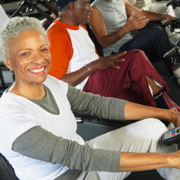
Approximately 25 percent of the population is afflicted with sleepless nights and can reach as high as 40 percent in older people. Most moms and grandmothers usually told us to count sheep or have a warm glass if we couldn’t sleep.
However, evidence is emerging that aerobic exercise can offer relief from insomnia.
A study funded by the National Institute of Aging showed evidence that aerobic exercise may help with your sleepless nights. The study, conducted at Northwestern University in Chicago, Illinois, tracked 23 women 55 and older who were previously sedentary adults and who had difficulty falling or staying asleep.
After 16 weeks their average sleep quality improved after they followed an aerobics training program that included exercising on a treadmill or stationery bicycle. "Most of poor sleepers became good sleepers," said Dr. Phyllis Zee, the lead researcher in the study.
The improved sleepers in Zee's study also reported better moods, fewer depressive symptoms and enhanced vitality. "Vitality is everything," Zee said. "It's how somebody feels, how alert. If you think about the complaints of poor health, people will always say, 'I feel so tired.'"
And according to Dr. David Davila of the National Sleep Foundation, we really don't know why people tell us that exercise helps them sleep. But if people are normally active, reaching their aerobic goals, chances are they will sleep the right amount for what they need. Also, Davila said the low-grade sleep deprivation suffered by many time-pressed, under-rested Americans has a cumulative effect.
"There are fallouts for the average person. People have more car accidents and what they call 'presentee-ism', or poor performance, at work,” said Davila.
"There's no scientific evidence that people need eight hours, seven is fine," said Dr. Shawn D. Youngstedt, an expert on sleep and exercise at the University of South Carolina. Youngstedt said, "It's far clearer that exercise has wonderful benefits. It's better than drugs for diabetes, mental health, cancer prevention." If your schedule dictates that you can only hit the gym at 5 a.m. he believes that an hour of exercise can do more good than an extra hour of sleep.
Dr. William Roberts, of the American College of Sports Medicine, cautions that for some people the time to exercise is not an hour before bed. "To exercise close to sleep time is not good for everyone," he explained. "Try to get a half hour to an hour of exercise early enough in the day and try to sleep on same schedule." Also, Roberts suggests doing something calming to wind down.
Roberts suggests avoiding the following before bedtime:
• Do not play video games
• Read away from bed and then go to bed.
• Avoid caffeine and other stimulants before turning in.
Source:
Reuters




Add a CommentComments
There are no comments yet. Be the first one and get the conversation started!